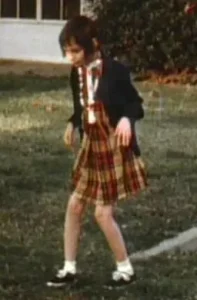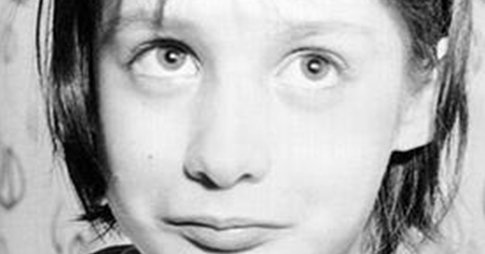More than 50 years ago, a 13-year-old girl shuffled into a Los Angeles welfare office, but she wasn’t like any child anyone had ever seen.
Frail and with hands curled like a frightened rabbit, she was mute and barely able to walk. She was called Genie — a name given to protect her identity — but her story would shock the nation and challenge everything we thought about language, the brain, and human connection.
Who was Genie Wiley?
Genie Wiley was born in 1957, in Arcadia, California. She could have been just like any other child — but her name will forever be linked to torture and abuse.
She was the youngest of four children and the second oldest to survive in her family. Her father, Clark Wiley, had worked as a flight mechanic during World War II and stayed in the aviation industry afterward. Her mother, about 20 years younger and from a farming family in Oklahoma, had moved to Southern California as a teenager with family friends escaping the
Genie’s early life was filled with heartbreaking neglect and cruelty. Born five years after her brother John, she seemed healthy at first but faced challenges like a congenital hip problem that delayed her walking. This delay fueled her father’s cruel belief that she was mentally disabled, and from that moment, he began to isolate and ignore her — even forbidding her mother and brother from interacting with her.
As she grew, Genie’s father’s behavior became terrifying. After a family tragedy, he spiraled into rage and paranoia, convinced the outside world was a threat. He confined Genie to a small, dark room, tying her to a child’s toilet during the day and a crib at night, sometimes even leaving her immobilized for hours. He forbade any noise from her, and if she made a sound, he would beat her. To silence her, he would growl like a dog and claw at her, instilling a deep fear of animals.

Genie’s diet was limited to baby food and liquids, often force-fed harshly, and she was rarely allowed outside or spoken to. Her father kept the whole family under his strict control — no TV, no radio, no normal conversation — making sure Genie never heard the sound of normal language or saw sunlight.
Her mother, mostly blind and terrified, couldn’t protect her and was beaten herself if she tried to help. Even Genie’s brother was forced into silence and sometimes made to participate in the abuse. Despite promises that help would come when Genie turned 12, her father broke his word, and the nightmare continued until she was finally discovered.
One of the worst child abuse cases
When Genie’s mother finally escaped with her to the welfare office, she stumbled into the wrong room, but what happened next changed many lives forever.
The staff at the Los Angeles social workers’ office initially believed they were dealing with a case of undiagnosed autism — but the horrifying truth soon came to light.
Doctors called her the most profoundly damaged child they’d ever seen.
When she was discovered, Genie was still in diapers — a pale, fragile figure, battered by years of neglect. Despite the brokenness, there was a haunting beauty about her, with a face that eerily resembled Anne Frank.
She had extra teeth, could barely chew or swallow, and couldn’t focus her eyes or control her limbs. She weighed only 59 pounds, like a child half her age.
Scientists from all over the country flocked to study Genie, fascinated by the possibility of understanding how language develops, or if it ever could, when someone misses the critical years of childhood.

Genie picked up a few basic words like “blue,” “go,” and “mother.” She was able to draw, complete puzzles, and communicate without speaking. However, mastering grammar — the rules and structure of language — proved impossible.
Scientists believe her brain’s “language window” had already closed. She moved with an unusual “bunny walk,” often spat, and couldn’t fully straighten her arms and legs. Quiet and incontinent, unable to chew properly, at first she only seemed to understand her own name and the word “sorry.”
Still, Genie’s story sparked fierce debates among linguists, psychologists, and caregivers. Some saw her as a miracle in progress, others feared she was slipping away again.
The tragic fallout
Sadly, after brief progress, Genie’s life spiraled back into darkness. Shortly after Genie turned 18, Genie was sent back to live with her mother. But within a few months, her mother admitted she couldn’t provide the care Genie needed. At her request, officials placed Genie into the first of several institutions and foster homes meant for adults with disabilities.
Unfortunately, these environments were anything but supportive. Fights broke out between her caretakers. Funding vanished. She was shuffled through foster homes and state institutions, hidden away from the public eye.
The trauma took a heavy toll: Genie’s health declined drastically, and the progress she had made in language and behavior quickly unraveled.
Those who had cared for her were haunted for decades. UCLA linguist Susan Curtiss, who had grown close to Genie, still longs to see her. Back in 2016, she told The Guardian:


